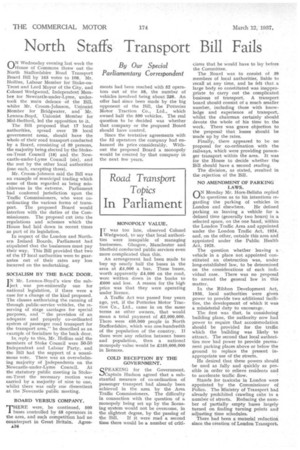North Staffs Transport Bill Fails
Page 52

If you've noticed an error in this article please click here to report it so we can fix it.
By Our Special Parliamentary Correspondent
ro Wednesday evening last week the 'L./House of Commons threw out the North Staffordshire Road Transport Board Bill by 163 votes to 108. Mr. Hollins, Labour Member for Stoke-onTrent and Lord Mayor of the City, and Colonel Wedgwood, Independent Member for Newcastle-under-Lyme, undertook the main defence • of the Bill, whilst Mr. Croorn-Johnson, Unionist Member for Bridgwater, and Mr, Lennox-Boyd, Unionist Member for Mid-Bedford, led the opposition to it.
The Bill proposed that 17 local authorities, spread over 20 local government areas, should have the whole of their road transport conducted by a Board, consisting of 39 persons, the majority being elected by the Stokeon-Trent Council (18) and the Neweastle-under-Lyme Council (six), and the rest by the other local authorities (one each, excepting three).
Mr. Croom-Johnson said the Bill was an example of municipal trading which some of them regarded as being mischievous in the extreme. Parliament had conferred jurisdiction upon the Traffic Commissioners, who were coordinating the various forms of transport. The proposed Board would interfere with the duties of the Commissioners. The proposal cut into the regulations and schemes which the House had laid down in recent times as part of its legislation.
In respect of the London and Northern Ireland Boards, Parliament had stipulated that the businesses must pay their way. This Bill provided that two of the 17 local authorities were to guarantee out of their rates any loss incurred on the undertaking.
SOCIALISM BY THE BACK DOOR.
IN Mr. Lennox-Boyd's view the sub ject was pre-eminently one for national legislation, if there were a case for a change of the kind proposed. The clauses authorizing the running of through public-service vehicles, the reserving of stage carriages for special purposes, and "the provision of an adequate and properly co-ordinated system of passenger road transport for the transport area," he described as an example of Socialism by the back door.
In, reply to this, Mr. Hollins said the members of Stoke Council were 50-50 Independent and Labour Party, and the Bill had the support of a unanimous vote. There was an overwhelming majority of Independents on the Newcastle-under-Lyme Council. At the statutory public meeting in Stokeon-Trent the necessary motion was carried by a majority of nine to one, whilst there was only one dissentient at the Newcastle public meeting.
BOARD VERSUS COMPANY.
THERE were, he continued, 600 buses controlled by 58 operators in the area, and such competition had no counterpart in Great Britain. Agree
A34 ments had been reached with 52 operators out of the 58, the number of vehicles involved being about 28. An offer had since been made by the big opponent of the Bill, the Potteries Motor Traction Co., Ltd., which owned half the 500 vehicles. The real question to be decided was whether that company or the proposed Board should have control, Since the tentative agreements with the 52 operators the company had enhanced its price considerably. Without the proposed Board a monopoly would he created by that company in the next few years.




















































































